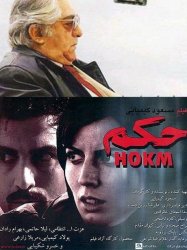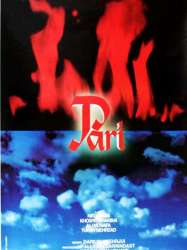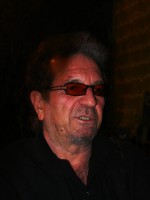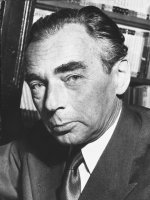Khosrow Shakibai is a Actor Iranien born on 27 march 1944 at Tehran (Iran)

Khosrow Shakibā'í or Khosro Shakibaei (March 27, 1944, Tehran, Iran – July 18, 2008, Tehran) (Persian: خسرو شکیبایی) was a celebrated Iranian stage and cinema actor. He ranks amongst the most accomplished of actors of his generation.
Khosrow Shakibai was born to Colonel Ahmad Shakibāi and Ms Farideh Khātami. His father, who was an army Colonel, died from cancer when Khosrow (called Mahmoud by family and close friends) was only fourteen. Khosrow studied acting at Faculty of Fine Arts of University of Tehran. He began his stage career in 1963 and branched out his activities into film dubbing in 1968. Shakibā'í initiated his film acting in 1982 with Khatt-e Ghermez (The Red Line), directed by Masoud Kimiai. He had played in seven feature films when the film director Dariush Mehrjui offered him the title role of Hamoun, a film that over time has achieved a cult status.
Shakibai's performance in Hamoun marked a turning point in his career. He received a Crystal Simorgh at Fajr International Film Festival for his portrayal of Hamoun, a literary intellectual who gradually loses his touch with reality and becomes entrapped into an obsessive and destructive conflict with his estranged wife whom he deeply loves. Shakibai played also in some major television series. He won a Crystal Phoenix for Kimiā (The Philosopher's Stone) (1994) directed by Ahmad Reza Darvish.
Shakibai found also a considerable following for his voice, brought about through publication of the recordings of his readings of poems by such luminaries of the modern Persian poetry as Forough Farrokhzad and Sohrab Sepehri.
Shakibai is credited for helping to raise the stature of performing arts in Iran by the end of the 1980s, when the authorities in charge tended to neglect this area of cultural activities.
He married twice. From his first marriage with the actress Tānyā Joharí he has one daughter named Poupak, and from his second marriage with Parvin Koush'yār one son named Pouria.
Source : Wikidata
Khosrow Shakibai

- Infos
- Photos
- Best films
- Family
- Characters
- Awards
Nationality Iran
Birth 27 march 1944 at Tehran (Iran)
Death 18 july 2008 (at 64 years) at Tehran (Iran)
Birth 27 march 1944 at Tehran (Iran)
Death 18 july 2008 (at 64 years) at Tehran (Iran)
Khosrow Shakibai was born to Colonel Ahmad Shakibāi and Ms Farideh Khātami. His father, who was an army Colonel, died from cancer when Khosrow (called Mahmoud by family and close friends) was only fourteen. Khosrow studied acting at Faculty of Fine Arts of University of Tehran. He began his stage career in 1963 and branched out his activities into film dubbing in 1968. Shakibā'í initiated his film acting in 1982 with Khatt-e Ghermez (The Red Line), directed by Masoud Kimiai. He had played in seven feature films when the film director Dariush Mehrjui offered him the title role of Hamoun, a film that over time has achieved a cult status.
Shakibai's performance in Hamoun marked a turning point in his career. He received a Crystal Simorgh at Fajr International Film Festival for his portrayal of Hamoun, a literary intellectual who gradually loses his touch with reality and becomes entrapped into an obsessive and destructive conflict with his estranged wife whom he deeply loves. Shakibai played also in some major television series. He won a Crystal Phoenix for Kimiā (The Philosopher's Stone) (1994) directed by Ahmad Reza Darvish.
Shakibai found also a considerable following for his voice, brought about through publication of the recordings of his readings of poems by such luminaries of the modern Persian poetry as Forough Farrokhzad and Sohrab Sepehri.
Shakibai is credited for helping to raise the stature of performing arts in Iran by the end of the 1980s, when the authorities in charge tended to neglect this area of cultural activities.
He married twice. From his first marriage with the actress Tānyā Joharí he has one daughter named Poupak, and from his second marriage with Parvin Koush'yār one son named Pouria.
Usually with
Filmography of Khosrow Shakibai (10 films)
Actor

Night Bus (2007)
, 1h30Directed by Kiumars Pourahmad
Origin Iran
Genres Drama, Comedy, Crime
Themes Political films
Actors Giovanna Mezzogiorno, Khosrow Shakibai, Valerio Mastandrea, Ennio Fantastichini, Elnaz Shakerdoust, Anna Romantowska
Rating66%





Pendant la guerre Iran-Irak, un jeune combattant iranien a la mission de livrer des prisonniers irakiens à un poste de garnison derrière le front. La tâche s’avère moins évidente qu’on le croyait. Le jeune doit affronter certaines difficultés sur le chemin. Puisque personne ne veut pas l’aider, il se débrouillera tout seul.

Who Killed Amir? (2006)
Genres Comedy, Crime
Actors Khosrow Shakibai, Niki Karimi, Mohammad-Reza Sharifinia, Elnaz Shakerdoust, Amin Hayai, Mahnāz Afshār
Roles Akbar
Rating57%






Verdict (2005)
Directed by Masoud Kimiai
Origin Iran
Genres Drama, Crime, Romance
Actors Ezatollah Entezami, Khosrow Shakibai, Leila Hatami, Bahram Radan, Merila Zarei
Roles Had-Misagh
Rating50%





Mohsen (Poulad Kimiai), Foroozandeh (Leila Hatami) are two former couple.They and Sahand (Bahram Radan) who is their friend go to an Engineer manager's house to rob his safe. After that they go to Reza Maroufi (Ezzatollah Entezami), an old retired gangster to take a fake passport for Foroozandeh. Mohsen and Forozandeh struggle in the way and Foroozandeh returns to Tehran. Maroufi and Sahand also come back to Maroufi's house in Tehran and They see Foroozandeh that is injured by Mohsen .....

Unruled Paper (2002)
, 1h50Origin Iran
Genres Drama, Comedy
Actors Khosrow Shakibai, Hedieh Tehrani, Jamshid Mashayekhi, Jamileh Sheykhi, Niku Kheradmand, Afarin Obeysi
Roles Jahangir
Rating67%





The film starts with a scene of a sitting room, empty of people, at some two minutes to 7 o'clock in the morning, and ends with a scene of the same empty room at some two minutes past 7 o'clock in the morning of some weeks later; this passage of time is accurately depicted by the brightness of the natural light that is reflected on the wall of a corridor, that leads to this sitting room, in the initial and final scenes. The meticulous attention that Taghvā'i has given to the accurate representation of even the most mundane aspects of the film would at first sight seem to be at odds with the fact that with the exception of the opening and closing scenes, in all other scenes where the clock on the wall of the sitting room is in sight, its pendulum is conspicuously motionless. The opening scene depicts some moments before the family starts a very active day (the day at which the two children of the family, Shangul and Mangul, have their first school-day after the summer school-holiday) and the closing scene, the end of a protracted Friday night, during which Jahāngir and Royā have spent an intellectually and emotionally exhausting night. The motionless pendulum suggests that the events in the intervening period have taken place out of time, or only in imagination. Although the work presented by Taghvā'i certainly qualifies as a surrealist art-form, this motionless pendulum serves as a more profound tool than a means that solely hints at surrealism. Taghvā'i conveys a number of unobtrusive verbal and visual messages to his viewers. Briefly, Taghvā'i and Ms Minoo Farsh'chi, the co-author of the film script, variously refer to the theory of eternal recurrence, as revived by e.g. Friedrich Nietzsche, with a strong emphasis on the importance of having a creative mind thereby to forge room for free will in at least an imaginative world.

The Double Lottie (1995)
, 1h40Directed by Kiumars Pourahmad
Origin Iran
Genres Drama
Actors Khosrow Shakibai
Roles Father
Rating65%





Deux camarades de classe, Nargues et Nasrin, se rencontrent dans une fête d’école. Elles apprennent qu’elles sont, en fait, des jumelles. Leur père compositeur s’est séparé de leur mère tailleur sans leur dire un mot de tout ça. Une des deux fillettes vivait avec leur mère et l’autre avec leur père.

Pari (1995)
, 1h55Directed by Dariush Mehrjui
Genres Drama, Romance
Actors Niki Karimi, Ali Mosaffa, Khosrow Shakibai, Parsa Piroruzfar, Mohammad-Reza Sharifinia
Roles Dadashi / Asad
Rating65%





Pari is a student of literature at a university in Tehran. She is a confident yet angry girl who is projecting her inner struggle by outwards aggression towards her tutor, her fiancé and her brother and she is on the verge of a nervous breakdown or a mental suicide.

The Double Lottie (1995)
, 1h40Directed by Kiumars Pourahmad
Origin Iran
Genres Drama
Themes Children's films
Actors Khosrow Shakibai
Roles Father
Rating65%





Narges and Nasrin are two elementary school girls who meet each other in a school festival and find out that they are twin sisters. Their parents were separated. Their mother was a dress maker, and their father was a composer and musician, but they have never told their kids about this. One of girls lives with their mother and another one lives with their father. The girls decide to change places, and their parents don't realize what they have done, because the girls look very much alike each other.

Sara (1993)
, 1h32Directed by Dariush Mehrjui
Origin Iran
Genres Drama
Themes Films based on plays
Actors Niki Karimi, Khosrow Shakibai, Amin Tarokh, Dariush Mehrjui
Roles Ghoshtasb
Rating65%





Sara is the perfect young housewife. However, when husband Hessam requires an expensive emergency operation abroad, it is she who gets the funds. For the next three years Sara labours secretly to pay the shady loan and save Hessam's pride... until the truth is revealed and, with it, the reality of her marriage.

Hamoon (1990)
, 2h2Directed by Dariush Mehrjui
Origin Iran
Genres Drama
Actors Khosrow Shakibai, Bita Farrahi, Ezatollah Entezami
Roles Hamid Hamoon
Rating78%





Hamid Hamoun who is an executive at a leading import-export firm lives with his wife Mahshid who is a budding artist in abstract painting. Mahshid hails from a rich family but marries the middle class Hamoun after falling for his intellectual tastes and forward views. After 7 years of marriage Mahshid who once was very much in love with Hamoun soon sees him as a constricting force against her desire to do something meaningful with her life. Hamoun who wishes to pursue a career as a writer while simultaneously preparing for his PhD thesis, occasionally takes out his frustration at his wife. Mahshid soon demands divorce from him. Hamoun is shocked to find out that his wife loves him no more. The story then depicts Hamoun's incapability to deal with the reality of losing his wife and living with his unfulfilled dreams. The subsequent scenes portray Hamoun's realisations coupled with dreamlike sequences resembling those from some of Fellini's movies. Hamoun vigorously attempts to meet his teacher Ali, whom he greatly admires, but never does. He then gives his grandmother a visit the purpose of which is to get a rifle which his grandfather had left. Hamoun unsuccessfully attempts to kill his wife who is now leading a good life on her own. Driven to the brink of madness by helplessness, Hamoun tries suicide by drowning himself in the sea. Hamoun goes through a dream where all his acquaintances and relatives including his mother and wife consoles him and Hamoun finds out (in the dream) that all his problems have been solved, only to wake up in the boat after being rescued by Ali, his teacher.

Dadshah (1982)
, 2h16Origin Iran
Actors Saeed Rad (Said Rād), Khosrow Shakibai, Jamshid Hashempour
Mir Dad Shah or Mir Daad Shah (Persian: دادشاه) was a farmer who lived in Nillag village of Iranian Balochistan in the fifties. He hated Mohammad Reza Pahlavi an oppressive administration which made him to pick up arms against shah. Daad Shah's wife Bibi Hatun also fought with him against his enemies. Dad Shah was support by Iraq through local Balochi politician Mir Abdi, who went into self-exile in Iraq for his people national struggle. Dad Shah killed tribal chief Sardar Muhammad Darani of Zahedan. Sardar Darani was the commander-in-chief of Zahedan area during Reza Shah. In 1957, Daad Shah’s tribal chiefs who betrayed him, by called him for negotiation and where he was killed in a gun battle by Iranian Forces. Mir Abdi persuaded by the Shah to return to Iran and gave privileges to stop his struggle for Baloch people. The struggle came to an end by an agreement between Iran and Iraq, where Iran stopped support for the Kurdish struggle in Iraq, while Iraq deprived the Baloch from theirs. But later Iraq give support to Balochi secretly till the 1980s, when Iraq-Iran War began Balochi groups given large amount of support in financial and weapons.
 Connection
Connection



